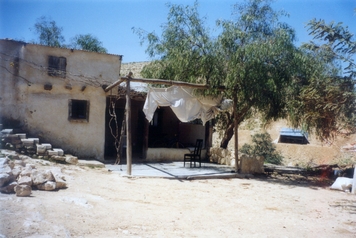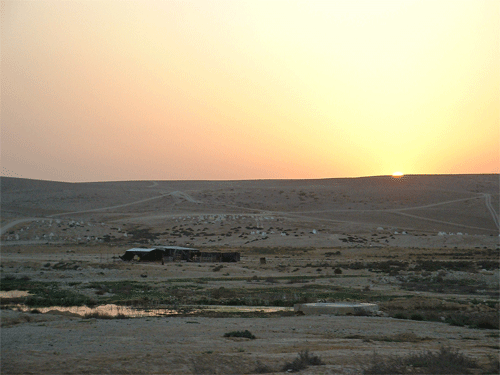
An 'illegall' home in Lakiya, Nagab
|
|
 An 'illegall' home in Lakiya, Nagab |
|
Women of the Tarrabin al-Sanaa, April 2:
|
|
The Tarrabin al-Sanaa are a tribe living on the edge of Omer, on the main road between Lakiya and Rahat, an Israeli Jewish settlement that is expanding rapidly. Some while ago this led to daily fights. People said that if a potato was stolen from Omer, the Green Patrol and Border Guards descended on the Tarrabin. Now it's more peaceful but negotiations have been going on about a transfer. Places that Israel offered were refused by the Tarrabin, places the Tarrabin wanted were refused by Israel. Now the Tarrabin say they prefer to stay where they are rather than go to a place that doesn't suit them. The land is very flat; nothing is growing. The houses are shacks made of wood and tin sheeting, close together as in a refugee camp. But unlike refugee camps, bedouin settlements never look crowded. You can drive on their dusty tracks for miles without seeing anyone.
We find the 'shigg', the men's diwan. The young men hang out here - they have nothing to do, and can't sit at home surrounded by women and children. They tell me
|
that the older men don't come until after prayers. A 'shabb' older than the rest, Sa'id, tells me that most of the young men who spend their time here have never been to school. They are unemployed and have no hope of work. No one from this group of Tarrabin has gone to university, and there are no girls who have got beyond primary school. A boy called Isma'il is deputed by the others to take me to meet his grandmother, Hajji Shamma. She's a lovely old lady - hennaed hair, pink-cheeked; we find her working with her penned sheep. We sit face to face on chairs. She tells me how she fostered Isma'il after his parents died, but refuses to record. She says that men from her family might hear and be angry. She says men should speak, women not.
Isma'il takes me to another home and another old woman. Here there is only earth to sit on. There are crowds of children. I understand here that the Tarrabin weren't expelled after 1948 but that people expelled from other areas were piled in on top of them. I don't even ask to photo them, the scene is too miserable. It would be an insult.
|
 Half of the 140,000 Bedouin in the Negev are living in homes unrecognised by the state, without water, electricity, sewage services, roads, schools and medical clinics. All building is illegal in these villages, forcing Bedouin families to live in tin shacks and tents that are unbearably hot in summer and icy cold during the desert winter nights. Photo: Jonathan Cook |
|
[Back to Lakiya] [Umm Ghazi] Copyright©2005 |
|
|